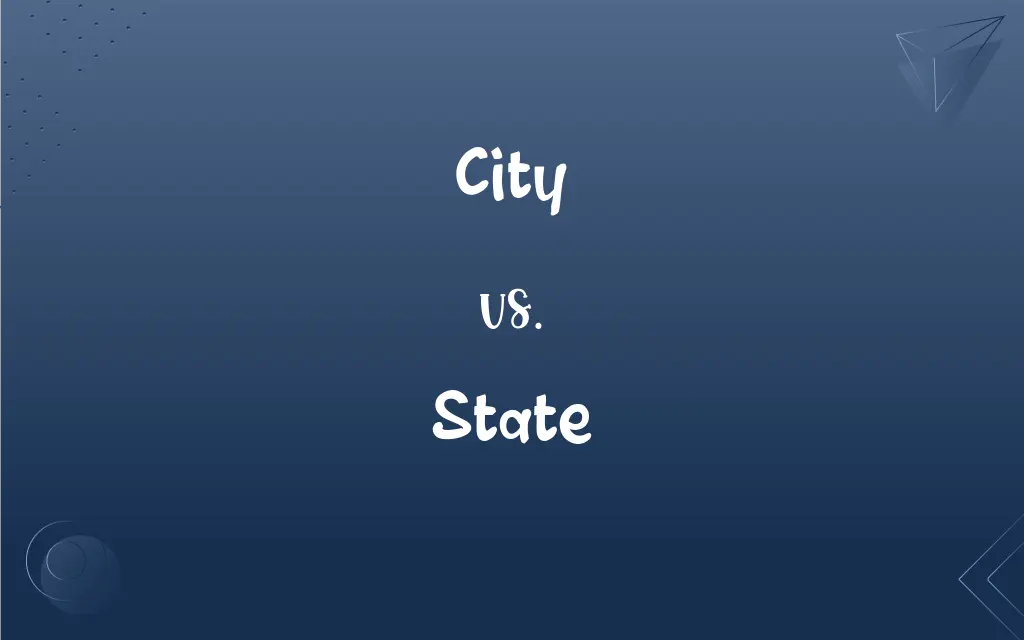City vs. State: What's the Difference?
Edited by Harlon Moss || By Janet White || Published on December 10, 2023
A city is a large, densely populated urban area, whereas a state is a larger political and geographical entity, often comprising multiple cities and towns.

Key Differences
A city is typically a large and densely populated urban area, characterized by its extensive infrastructure, commercial, and cultural facilities. A state, in contrast, is a broader political and geographical unit that can encompass cities, towns, and rural areas, with its own government and defined boundaries.
Cities are often hubs of business, culture, and social interaction, containing diverse communities and offering various services and amenities. While, states encompass a wider range of environments and communities, from urban centers to rural landscapes, each with its own unique characteristics.
The governance of a city usually involves a mayor or city council focused on local urban issues like zoning, public transportation, and municipal services. A state government, on the other hand, deals with broader issues such as statewide legislation, education systems, and infrastructure projects.
In terms of scale, cities vary widely in size but are generally smaller than states. States cover larger geographical areas and include multiple cities, towns, and often natural landscapes like forests, rivers, and mountains.
Cities often serve as cultural and economic centers within a state, driving innovation, and development. States provide a broader framework of governance and policy that shapes the overall environment and resources available to the cities within them.
ADVERTISEMENT
Comparison Chart
Scale
Smaller, urban area
Larger, encompassing urban and rural areas
Governance
Local government (e.g., mayor, city council)
State government with broader jurisdiction
Function
Focus on urban issues, infrastructure, services
Deals with statewide policies, laws, and resources
Components
Includes residential, commercial, cultural areas
Comprises multiple cities, towns, and natural areas
Role
Economic and cultural center within a state
Provides overall governance, infrastructure, education
ADVERTISEMENT
City and State Definitions
City
A large and densely populated urban area with significant cultural, economic, and administrative functions.
New York City is known for its vibrant culture and bustling streets.
State
A territory within a country, having its own government and regulations.
The state government introduced new educational reforms.
City
An urban center distinguished by its size, population, and importance.
The city was buzzing with activity during the festival.
State
A condition or situation at a particular time.
The state of the economy has been a major topic of discussion.
City
A municipality with its own government and administrative services.
The city council voted on new urban development plans.
State
A ceremonial or formal occasion.
The state dinner hosted by the president was an elegant affair.
City
An area with high population density and advanced infrastructures such as roads and buildings.
The city skyline was dominated by skyscrapers and modern architecture.
State
A distinct political entity with its own government, laws, and jurisdiction.
California is the most populous state in the United States.
City
A hub of commerce, transportation, and housing within a region.
The city's downtown area is a major commercial hub.
State
A level of function or efficiency of something.
The state of the machinery was excellent after the overhaul.
City
A center of population, commerce, and culture; a town of significant size and importance.
State
A condition or mode of being, as with regard to circumstances
The office was in a state of confusion.
City
An incorporated municipality in the United States with definite boundaries and legal powers set forth in a charter granted by the state.
State
A condition of being in a stage or form, as of structure, growth, or development
The fetal state.
FAQs
Can a city exist outside of a state?
In most cases, cities are part of a state, but some cities, like city-states, are independent.
What's the role of a state government?
State governments manage broader issues like education, transportation, and public safety across their territory.
Are all cities the same size?
No, cities vary greatly in size and population.
What services do cities provide?
Cities provide services like policing, fire protection, public transportation, and urban planning.
What defines a state?
A state is a political and geographical unit within a country, with its own government and laws.
Do states have their own laws?
Yes, states have the power to enact their own laws within their jurisdiction.
How do cities impact the economy?
Cities are often economic hubs, driving business, innovation, and job creation.
What is a city?
A city is a large, populated urban area with its own local government and services.
Can a state govern cities within it?
Yes, state governments have authority over cities within their jurisdiction.
What is the role of a city mayor?
A city mayor typically leads the city government, overseeing local administration and policy.
Can states have their own educational standards?
Yes, states often set their own educational standards and systems.
What makes a city popular?
A city's popularity can stem from its culture, economic opportunities, and quality of life.
Do states have their own constitutions?
Yes, many states have their own constitutions, outlining their government structure and laws.
Can a city change its status?
Yes, cities can change in status, size, and governance through legal and administrative processes.
Are cities always urban?
While cities are generally urban, some may have suburban or even rural characteristics.
Are state laws uniform across the country?
No, state laws can vary significantly from one state to another.
What is state sovereignty?
State sovereignty refers to the authority of a state to govern itself within its territory.
Do cities have their own taxes?
Yes, cities can levy taxes for local services and infrastructure.
How do state and federal laws interact?
State laws must comply with federal laws, but states have autonomy in areas not governed by federal law.
Can cities have their own foreign policies?
No, foreign policy is typically the domain of national governments, not individual cities.
About Author
Written by
Janet WhiteJanet White has been an esteemed writer and blogger for Difference Wiki. Holding a Master's degree in Science and Medical Journalism from the prestigious Boston University, she has consistently demonstrated her expertise and passion for her field. When she's not immersed in her work, Janet relishes her time exercising, delving into a good book, and cherishing moments with friends and family.
Edited by
Harlon MossHarlon is a seasoned quality moderator and accomplished content writer for Difference Wiki. An alumnus of the prestigious University of California, he earned his degree in Computer Science. Leveraging his academic background, Harlon brings a meticulous and informed perspective to his work, ensuring content accuracy and excellence.







































































